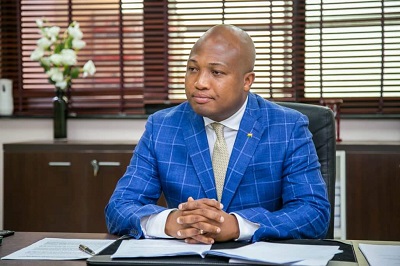Member of Parliament for North Tongu, Samuel Okudzeto Ablakwa has offered government options it could consider to generate revenue for the country instead of pushing ahead with the implementation of the Electronic Transaction Levy (E-Levy).
In a post on Twitter, he noted that the measures proffered, if put together, can raise more than the government’s projected proceeds from the E-levy.
“There is a clear alternative to the killer e-Levy if only President Akufo-Addo and his team would be sensitive to the plight of suffering Ghanaians and contain their appetite for profligacy," Mr. Ablakwa wrote.
Among other things, the MP suggested the cutting down of allocations to Parliament and pulling the brakes on Agenda 111.
He explained that “Agenda 111 remains a knee-jerk utopia, pull the brakes and save GHS518million.”
Below are the options from Mr Ablakwa on new ways to raise revenue:
1) Take out GHS2billion from the GHS3.1billion allocated to the Office of Government Machinery;
2) Suspend the allocation to GAT and immediately GHS1billion becomes available for the government;
3) Negotiate with IPPS and reduce their allocation from GHS4billion to GHS3billion;
4) Review the nebulous GhanaCARES programme and save another GHS1billion;
5) Cut the Contingency Vote down to GHS293,007,000 and free up some GHS700million;
6) Agenda 111 remains a knee-jerk utopia, pull the brakes and save GHS518million;
7) Slash by half the allocation to the National Security Ministry and gain some GHS400million;
8)Parliament should readily sacrifice some GHS200million from its GHS600million allocation;
9) Place on hold the hazy Mortgage Financing Scheme at the Ministry of Finance and save GHS100million.
Ending the list, Mr. Ablakwa added that “put the above expenditure cuts together and the government immediately raises a handsome GHS6.918billion which exceeds the e-Levy projections.”
Another option for government to raise its desperately needed GHS6.9billion: pic.twitter.com/zndTEnysuX
— Sam Okudzeto Ablakwa (@S_OkudzetoAblak) January 31, 2022
E-Levy
Finance Minister Ken Ofori-Atta, presenting the 2022 budget on Wednesday, November 17, announced that the government intends to introduce an electronic transaction levy (e-levy).
The levy, he revealed, is being introduced to “widen the tax net and rope in the informal sector”. This followed a previous announcement that the government intends to halt the collection of road tolls.
The proposed levy, which was expected to come into effect in January, 2022, is a charge of 1.75% on the value of electronic transactions. It covers mobile money payments, bank transfers, merchant payments, and inward remittances. There is an exemption for transactions up to GH¢100 per day.
Explaining the government’s decision, the Finance Minister revealed that the total digital transactions for 2020 were estimated to be over GH¢500 billion (about $81 billion) compared to GH¢78 billion ($12.5 billion) in 2016. Thus, the need to widen the tax net to include the informal sector.
Although the government has argued that it is an innovative way to generate revenue, scores of citizens and stakeholders expressed varied sentiments on its appropriateness with many standing firmly against it.
Even though others have argued in support of the levy, a section of the populace believe that the 1.75% e-levy is an insensitive tax policy that will deepen the already prevailing hardship in the country.
Below is the timeline for the E-levy controversies
.
Latest Stories
-
Burnley score late to draw with Manchester United at Old Trafford
1 hour -
Bayer Leverkusen extend unbeaten run to 46 games after draw with Stuttgart
1 hour -
Chelsea come from two goals down to draw against Aston Villa
1 hour -
Andre Ayew scores in Le Havre’s 3-3 draw with PSG
1 hour -
GPL 2023/24: Kotoko draw with Medeama; Samartex go 7 points clear of Nations FC
2 hours -
Mahama cuts sod for construction of new multipurpose Jakpa palace in Damongo
2 hours -
NSS management assists Papao fire victims
3 hours -
EXPLAINER: Will dumsor end soon?
3 hours -
IMANI Africa takes on EC, accuses it of lying and publishing half truths
4 hours -
Manasseh Azure calls for investigation and prosecution of those responsible for GRA/SML contract
4 hours -
Kwesi Atuahene: Ghana’s health capital depends on HealthTech – Africa Center for Digital Transformation
5 hours -
13 signs your wife is planning on leaving you and you have no idea
5 hours -
IMANI Africa: Ghana’s EC’s dangerous and pathological conduct
5 hours -
If I speak there will be fire – Salah on Klopp row
6 hours -
Grieving after divorce is normal, but this particular kind of grief isn’t
6 hours

